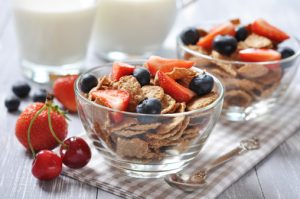
The researchers found that dietary fiber offers clinical benefits to IBD patients. More specifically, they found that supplementation of certain types of dietary fiber (whole wheat bread and vegetables) can maintain disease remission and reduce lesions along the intestines. The researchers suggest that dietary fiber should not be reduced in IBD patients, even though this is what many organizations that deal with IBD recommend.
The key benefit of dietary fiber is the increase in luminal production of short-chain fatty acids (SCFA) such as butyrate. Butyrate is a key component for colon health, since it is the main energy source for colonic cells and has anti-carcinogenic and anti-inflammatory properties.
Additional research is required to further explore how dietary fiber can aid in IBD therapy.
Inflammatory bowel disease and nutritional choices
Adhering to a healthy and nutritious diet is essential for IBD patients as food plays a large role in flare-ups, remission, and even disease progression. Eating well promotes remission and a reduction in symptoms, but eating unhealthy can speed up the progress of the disease and cause irreversible damage to the intestinal walls.
Although there is no evidence to support a specific diet as more successful than another in the management of IBD, there is a general consensus that eating healthy can support overall good health.
With a growing number of studies examining the role of food and diet in IBD, we – hopefully – become closer to finding potential dietary solutions to aid in IBD management. Finding a universal meal regime that works is difficult – or may not even be possible – as each person is different. Nonetheless, a set of dietary guidelines can at least offer patients some options they can try and experiment with.
Inflammatory bowel disease and fiber: Low-residue diet
Many organizations recommend that IBD patients follow a low-fiber or low-residue diet. In this diet, patients reduce their intake of foods that add a “scrap” residue on the stool – like raw vegetables and fruits, seeds, nuts, and corn hulls.
For some patients, this style of eating is temporary, and they may only stick to it until the inflammation – which caused narrowing of the bowel – begins to respond to medication or a surgical procedure.
On a low-residue diet you can eat:
- Refined or enriched white breads and plain crackers, such as saltines or Melba toast (no seeds)
- Cooked cereals, like farina, cream of wheat, and grits
- Cold cereals, like puffed rice and corn flakes
- White rice, noodles, and refined pasta
- Well-cooked fresh vegetables or canned vegetables without seeds, such as asparagus tips, beets, green beans,
- carrots, mushrooms, spinach, squash (no seeds), and pumpkin
- Cooked potatoes without skin
- Tomato sauce (no seeds)
- Ripe bananas
- Soft cantaloupe
- Honeydew
- Canned or cooked fruits without seeds or skin, like applesauce or canned pears
- Avocado
- Milk and dairy in moderation (be mindful of possible dairy intolerance)
Speak to you doctor about potentially embarking on a low-residue diet or whether it is necessary for your condition.